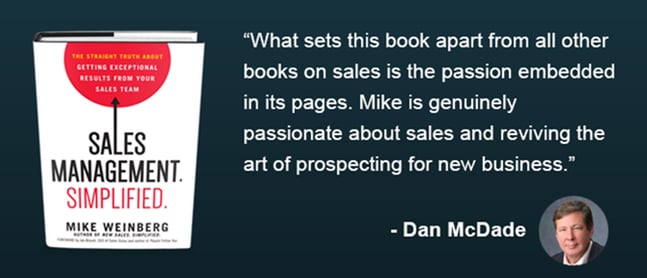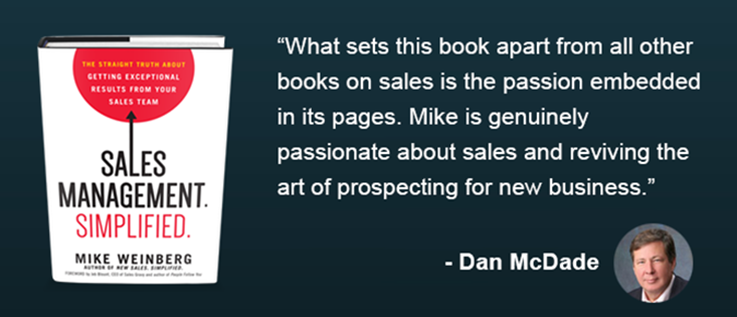
Some months ago I reviewed Mike Weinberg’s book: New Sales. Simplified. I thought at that time, as I do now, that it was the best book on sales available. So when Mike asked me if I would be interested in reading and possibly reviewing his new book, Sales Management. Simplified., I jumped at the chance.
The foreword to Sales Management. Simplified., written by author and consultant Jeb Blount, states “how desperate businesses are for a solution to the #1 problem plaguing twenty-first century companies: underperforming salespeople in dysfunctional and sub-optimized sales organizations.”
In the introduction to his book, Mike makes the same observation: “Everywhere I turn, sales managers are overwhelmed and often confused, and executives are frustrated.” The book is broken into two parts. Part One is filled with “true stories about real sales managers and real executives in real companies, big and small.” Part Two presents “a very simple, practical sales management framework that any company or leader can implement.”
After reading the book I thought readers would really benefit from an interview with Mike. He agreed and I’m happy to share Part 1 with you today:
Dan McDade (DM): Mike, in Chapter 1 of your book you quote a mentor as saying: “As goes the leader, so goes the organization.” You followed this with “The level of the team rarely, if ever, exceeds the level of its leader.” In New Sales. Simplified. you write: “Where I’m from, it’s the chief executive’s job to determine and articulate the company’s strategy. It’s essential to be able to inform the sales team about: our reason for existence, the direction of the company and why it’s the correct course, what we sell and why we sell it, which markets to pursue, the competitive landscape and the pricing model.”
Some years ago I worked with a company that blew through $100,000,000 in venture capital because marketing was promoting point solutions and sales was selling an enterprise solution. I once told the SVP of Sales (still a friend) that he had more sales reps than there were $1,000,000 plus deals for his company’s solution. They ran out of cash and were sold in a fire sale. The CEO never was able to get sales and marketing on the same page.
It is said that CEO’s care about revenue but they don’t care about leads and databases. In my opinion CEO’s should care about revenue, leads and databases. Are companies failing because the CEO does not know what to do, or are companies failing because the CEO can’t conquer the dysfunctional nature of their organization?
Mike Weinberg (MW): Dan, I’d love the chance to blow through $100 million! I think most senior executives are frustrated with their sales teams because results are inconsistent and not what they should be. Then the executive looks at the sales managers and realizes how little “leading” of the sales team is actually taking place. The odd part, however, is that it’s often the frustrated CEO who is burying the sales leader in all kinds of crap and dragging him/her to meetings that have zero to do with leading the sales team or driving new revenue. It’s madness.
You also allude to the CEO’s responsibility to set strategy. That’s a huge issue. Very often I see companies with “sales” problems that have nothing to do with sales. If the strategy isn’t crystal clear and we can’t point the sales team toward the right target accounts to attack, that’s a company leadership problem and a strategy problem, not a sales problem. The sales manager’s job is to lead his team into battle and to execute the strategy that’s been set at the top; it is not to make up the strategy on the fly hoping the team is going the right direction.
DM: In Chapter 2 you write about sales culture. You contend, and I agree, that we have become too politically correct to publish sales results. Tell us what you would measure and publish and why.
MW: It’s absolute madness that companies have gotten away from the public posting and distribution of sales reports. Sales is still about results last time I looked. We should be looking at specific sales and possibly margin goals for the sales team and for each individual producer. I also like to measure progress against specific goals like the number of new accounts acquired, and total dollars sold to new accounts. I also like to compare an individual salesperson against his/her peers. Where do they rank for sales versus goal for the month or YTD? There is nothing politically incorrect about publishing a sales ranking. The goal is not to embarrass anyone; it’s to keep our eyes laser focused on results. If an underperformer is made uncomfortable seeing their name at the bottom of the ranking–good! They should change their behavior or consider deselecting themselves.
DM: In New Sales. Simplified. you write about aiming high in organizations when selling to them AND “You know what you typically find in the executive suite? Nicer people. Smarter people. More professional people. Bigger-thinking people. People more interested in achieving the goals than beating up a vendor over a nickel.” You state that “most executives are more concerned with solving business issues and achieving better results than they are with protecting their jobs or the status quo.” What kind of job are sales managers doing on this today and what could they do better?
MW: That’s exactly what I wrote and that’s even more true today! In general, I am not seeing managers invest anywhere near enough time pointing their team toward strategic target accounts or coaching salespeople how to pursue higher-level contacts at those prospects. Honestly, aside from accountability, what could be more powerful for driving improved results than ensuring the team is pursuing the right people at the right accounts and that team members are armed with great weapons to succeed on their sales mission. Managers could do a much better job modeling good sales behaviors (like conducting consultative sales calls that bring value to executives) for their people.
DM: Tell us about multipliers and diminishers and the difference between being the hero and making heroes.
MW: I give Liz Wiseman 100% credit for this brilliant concept. I heard Liz speak at a conference five years ago and her book “Multipliers” is a must read. Multipliers are the kind of leaders everyone wants to work for. They challenge their people and bring out the best as they multiply themselves by raising the game of team members. Diminishers are the opposite. They shut down their people with pontificating to make sure everyone knows they are the smartest person in the room. Instead of pointing to the big goal, they not only tell their people what to but also how to do it. I take Wiseman’s theory and apply it to sales managers. She says that great leaders (multipliers) are more concerned with making geniuses than being seen as the genius. In sales, the manager’s job is to make the salesperson a hero, not to be the hero. Unfortunately, there are a lot of high-ego, insecure sales managers who do the opposite. They steal the limelight and the credit from their people. And nothing disengages the heart of a salesperson faster than when a manager takes the credit for their success. Yuck!
DM: You quote Neil Rackham in your book. He suggests that to determine if sales people are doing a “good job” in front of the customer, we should ask this question: “Are your people making the kind of sales calls where the customer would write a check for the sales call … because the sales call did something so useful for the customer that the customer values it?” I perceive that CBE’s The Challenger Customer and the account-based marketing approach would target the same type of companies that would apply to Neil’s quote. Agree?
MW: Yes, completely. In fact, I believe Rackham was making that statement in support of CEB’s work. Whatever your feelings about The Challenger Sale, Rackham makes a great point and truly raises the bar for how salespeople should view sales calls. I regularly quote Rackham and ask salespeople what would have to take place on sales calls to bring so much value to the customer that they’d be happy to pay you for the time spent with them. That’s a really high bar that forces some truly big thinking. I love it because salespeople are immediately challenged to rethink the sales call and see it through the lens of the customer.
DM: In both books you take issue with the inbound marketing crowd who chant the “Don’t call them; they’ll call you when they’re ready …” mantra. We agree that’s nonsense. In the book you go on to write: “I take issue with the many loud voices preaching these deadly lies. These theories are not only wrong, they’re dangerous. They’re particularly dangerous because today’s under-mentored and under-coached sales people are gullible. The sole reason prospects get that far along in their buying journey without having engaged with a sales person is that reactive sales people are sitting on their collective butts waiting for the prospect to raise their hand and call them in.” It seems the market is shifting away from the “inbounditis” of the past. However, there are still a lot of sales reps sitting around waiting for the telephone to ring. What can sales managers do to fix this?
MW: Dan, I agree. The tide is turning as the Kool-Aid being served by the Inbound and Social Selling extremists proved not to be the secret sauce it was promised to be. So it’s a good thing that those hysterical voices preaching that everything has changed and that prospecting is dead are starting to get drowned out. The time is right for sales managers to ensure that every salesperson has a strategic, finite, workable list of target accounts to work, AND that some percentage of each rep’s calendar has time blocked for proactively pursuing prospecting customers. We need to snap salespeople’s expectations back into reality. Leads are not free and they don’t grow on trees. Most of the top producers at my clients take full responsibility for creating their own leads. And they also understand that when you create a lead from scratch, it’s easier to “own” your sales process because the prospect didn’t come to you and is less likely to try to dictate your approach.
DM: You write that “social media is a wonderful supplement to, but not a replacement for, traditional prospecting and new business development efforts.” How is social media misused and how should it be used?
MW: Social media is misused in a myriad of ways by salespeople. Some reps spend hours lurking around in LinkedIn groups looking for opportunities to comment or hijack a conversation. Others have been duped into writing blog posts because goofballs in my business who get business by putting out content and IP preach that salespeople should do the same. I am not sure there is a dumber idea than telling all salespeople they need to write blog posts. Have you seen how much trouble some salespeople have even writing a brief email? Do we really think for a minute that a top sales hunter should spend hours writing content and promoting it on social platforms?
However, social media offers great tools to help us learn much more about prospects than we ever imagined just a few years ago. It also provides opportunities to connect much earlier with prospects in non-threatening and non-intrusive ways. I’m a huge fan of social selling. My problem is with the charlatans who tell salespeople that it’s the replacement for that old school stuff like the telephone that doesn’t work anymore.
Topics: Sales Process, B2B Sales





